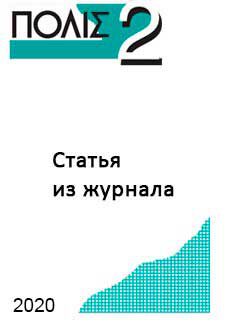Online shop of "Polis. Political Studies" Journal
We in the world, the world in us
Sapronova M.A., Chechevishnikov A.L., Yarlykapov A.A. Forming a Scientific Community. A Consolidated Portrait of Researchers of Russian Islam. – Polis. Political Studies. 2020. No. 2. P. 122-136. (In Russ.).
Free!
Islam, Islamic Studies, Russian ummah, scientific community, Oriental Studies.
Based on the survey conducted among Russian scientists who specialize in studying Islam in Russia, the first attempt to characterize the formation of this scientific community has been made. The Soviet era suppressed studying Islam in the USSR, although scientists had an opportunity to carry out research on Islam abroad. Consequently, post-Soviet communities of Islamic scholars in Russia emerged from Soviet Research Centers of Oriental Studies and include “Soviet” orientalists. Islamic schools, which have appeared in the last decade, also play a significant role in their formation. Many clergy have secular academic degrees. Secular educational and scientific institutions, in their turn, contribute to the establishment of Islamic universities, as Islamic education in Russia synthesizes religious and secular knowledge. Researchers into Islam often have a diverse education, and do not necessarily specialize in one sphere. A scientific background can be accompanied by a thesis on Islamic studies. Since 2008, an increase in academic activity on Islamic topics has taken place, as a result of the government’s decision to train specialists with a deep knowledge of Islamic history and culture who could work in Islamic religious organizations. This primarily refers to publications in journals, since the number of monographs, as well as works in English, does not increase. The majority of scholars questioned studying local Muslim communities and Islam at a regional level due to the diversity of Muslim communities in the country. Studying Russian traditions in Islamic theology, especially Jadidism, also has attracted scientists’ attention. For a number of years, the Muslim community has been involved in a discussion on the nature of “traditional” and “non-traditional” Islam in Russia. Theological and philosophical issues are raised in connection with those of political Islam, extremism, and terrorism. There are virtually no works on Islamic finance and economy, as well as there being a lack of research related to the interaction between the state and Islam and the activities of religious Muslim organizations. There are also no studies of Russian Muslims and Muslim migrants’ interaction. Remaining very mosaic, Islam in Russia is changing dynamically. The authors believe that the currently prevailing regional research paradigm inhibits understanding of the processes occurring in the Russian Islamic community. It is necessary to provide an extensive insight into Islam development in Russia. In order to create a holistic picture, field research should be conducted in different regions of the country. This should be done taking into account the global situation, primarily the situation in the Middle East, and also considering the existence of informal Islamic networks. Deep cooperation with scholars in Arabic studies is needed.
 English
English Русский
Русский

Reviews
There are no reviews yet.